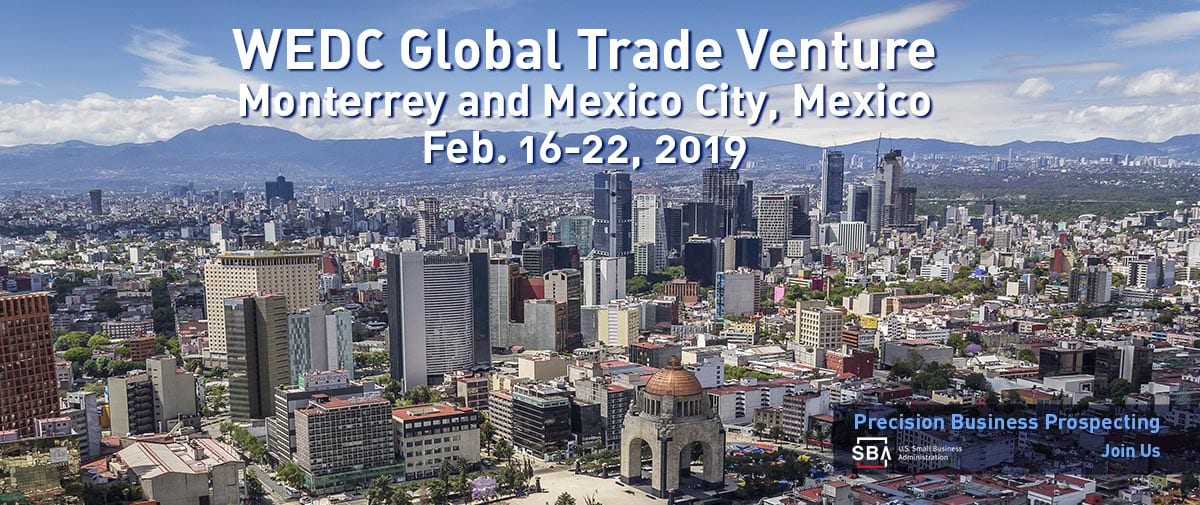
A strong and growing market for U.S. exports
Mexico is the second-largest export market for U.S.-produced goods ($267 billion in 2017), as well as for goods produced in Wisconsin ($3.2 billion in 2017). Trade pathways between the U.S. and Mexico are well-traveled; a long history, geographic proximity and the North American Free Trade Agreement (NAFTA) also make Mexico a relatively easy market to enter for companies that are new to exporting. NAFTA has been in place for 25 years, and although uncertainty over its possible renegotiation is certainly understandable, the opportunity to modernize and tweak aspects of the agreement in order to better reflect the realities of today’s integrated global economy is promising. Even in the extreme case that the U.S. withdraws from NAFTA, this would not end trade between the U.S. and Mexico. NAFTA has created a truly hemispheric supply chain that has become an essential fact of life for small businesses and major manufacturers alike.
Wisconsin actually has a trade surplus with Mexico, exporting more than it imports—and Wisconsin’s exports to Mexico further increased from 2016 to 2017. In addition, many products assembled in Mexico are made from U.S. parts, even imports from Mexico often benefit U.S. companies.
Business connections
In February 2019, the Wisconsin Economic Development Corporation (WEDC) will be leading a global trade venture to Mexico. Wisconsin companies, whether new to exporting or looking to expand their exports into Mexico, are invited to participate in this program, which will travel to Mexico City, the largest city in Mexico, and to Monterrey, which is Mexico’s third-largest city by population and second-largest in terms of its contribution to GDP, and has a high concentration of manufacturing facilities aligned with Wisconsin’s key industry sectors.
In each city, participants will be scheduled for one-on-one meetings with potential partners in the market. These partners are hand-picked for each participating company. Each participant in the global trade venture will also receive a Mexico market assessment specific to his or her company, detailing considerations they should keep in mind when introducing their product or service into the market. WEDC has eyes and ears on the ground in Mexico, in the form of Wisconsin’s authorized trade representatives—thus making it easier for Wisconsin companies to find local partners they can trust, and taking some of the guesswork out of launching in a new market or growing exports within the market. With all your appointments arranged for you, you can focus on business rather than logistics and scheduling.
Mexico outlook
Since Mexico is one of the top export markets for U.S. companies across all sectors, Wisconsin companies from a broad range of sectors are encouraged to attend this trade venture. Leading export categories from Wisconsin to Mexico include industrial machinery, electrical machinery, vehicles and parts, paper products, plastics, and medical and scientific instruments. With Mexico’s growing middle class, consumer products of all kinds are a major opportunity. U.S. products are already well represented (and thus well known and trusted) in the market, and are perceived to be a good value for the price.
Mexico City is one of the world’s largest cities, with 21 million people in the greater metropolitan area. A key economic driver for the country, the metropolitan area is home to many corporations’ worldwide or regional headquarters, and in particular is a hub for aerospace manufacturing. Wisconsin companies’ meetings in the area may take place in nearby cities, such as Puebla, Toluca and Queretaro.
Monterrey, in the state of Nuevo Leon in northeastern Mexico, has a population of 4.5 million in the greater metropolitan area. Major industries include automotive and food and beverage. Northeastern Mexico is a major agricultural region, and is also the location of many maquiladora facilities of U.S. manufacturers. Gone are the days of Mexico’s factories using outdated technology—instead, many of today’s factories have cutting-edge “smart” technologies that make use of sensors and automation to maximize efficiency. Thus, Wisconsin original equipment manufacturers (OEMs), as well as companies that provide engineering services, may find opportunities to help Mexican factories further upgrade their technology.
Companies in all Wisconsin’s sectors of strength—advanced manufacturing; food and beverage processing; biohealth; energy, power and control; water technology; forest products; and aerospace—are encouraged to participate in this trade venture. This global trade venture is appropriate for companies that are new to exporting, but can also help companies take the export strategies for Mexico from accidental—simply accepting the orders that come in—to strategic—seeking out the right partners and customers to fuel major growth in the market. In addition, the trade venture may afford an opportunity to interact with U.S. companies that have a presence in Mexico, with potentially easier access to key decision makers than by approaching the same company’s main office in the U.S.

Funded in part through a grant from the U.S. Small Business Administration






